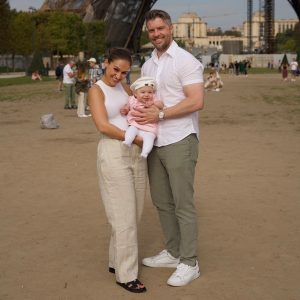"Physicians can typically only help one patient at a time, and while I find that portion of my job important and very rewarding, layering in public health skills and this degree will allow me to broaden my impact."
First, I’d like to know a little bit about you as a person. Where did you grow up? Where did you attend undergrad and what was your degree/area of study? [Aaron] I grew up about 30 minutes south of the University in Lakeville, MN and lived there all the way through high school. After graduation, I wanted to branch out of the state so I went to the University of Indiana for my undergrad education. Then, I went on to med school at Touro University in Nevada, and followed that up with an anesthesia residency at the University of Michigan. Finally, I did a fellowship in Regional Anesthesia and Ambulatory Medicine at the University of Minnesota and now work as the Director of Fellowship and was just promoted to an Associate Professor at the University of Minnesota Medical School.
What was that moment in your life when you decided you wanted to study public health?
[Aaron] Physicians can typically only help one patient at a time, and while I find that portion of my job important and very rewarding, layering in public health skills and this degree will allow me to broaden my impact. My time in clinical research helped me analyze problems from a higher level and this degree will enable me to get a seat at the table where big decisions are being made so that I can have a broader impact on patients.
What specific issue, problem, or area of research in public health do you care the most about and why? [Aaron] Most of my clinical research is on pain and minimizing opioids. It’s a problem with a large scope and I plan on doing more with it in the future. Currently, I’m trying to find ways to minimize opioids during surgery and post-operatively, but in the scope of public health I’d be able to look into things like prescribing trends and limits, chronic addiction, and the conversion from acute to chronic use. The one that really gets me excited is changing the culture of hospitals and the public perception that surgery equals pain and pain needs opioids.
How would you like to help address or explore this issue? [Aaron] Culture change doesn’t happen overnight. It takes education, follow-up, incentives, buy-in from all levels and lots of help. But with some effort, I hope we can create a new culture where acetaminophen, NSAIDs, ketamine, and adjuctions are all thought of before opioids.

Why did you choose to come to the U of M School of Public Health? [Aaron] I chose the U of M School of Public Health for a couple of reasons. The way the classes are scheduled in the MHA Executive program allows me to work full time and still be actively engaged in the classes so I’m not just checking a box to get a degree; the U of M is also local for me, which is nice. Despite online classes, we get to meet in-person three times a year with our cohort allowing us to really get to know each other. There’s also the prestige of it; the School of Public Health is a really well known school and the teachers are very into innovating teaching methods that make healthcare better.
What are the reasons why you chose your program? What do you like about it? [Aaron] I chose this program after interacting with some past graduates. There’s always those people who seem to know a lot and have a lot of experience, and what I’ve found was that those people had almost all done an MHA degree, most of which were completed here at the U of M. What I like about it is that it’s very directed at the things I’m after in my career, such as moving up the administrative route to make broader changes. If you want to be in hospital leadership, you have to have the education to back it up and this degree helps you do your job better.
What has been your favorite class so far? [Aaron] Innovation of Healthcare Services (PubH 6565) taught by Ryan Armbruster. The course taught me to think differently and to find ways to nurture those ways of thinking in myself and others. It was a very fun class with excellent speakers who I would have otherwise probably not been able to meet or been able to hear them give candid advice.
In what ways is the school a good fit for you? [Aaron] The classes themselves have been nice because typically I interact with physicians and nurses all day, and those people always have the mindset of a practitioner. With the MHA executive cohort, I get to work with people from other systems and backgrounds who think differently and come from different fields.
What do you like about being in Minnesota? [Aaron] Minneapolis is great. It’s home. My family is here. Minneapolis is large enough that there’s a lot of culture and great food options. I love the parks, the entertainment, and we have a great airport.

